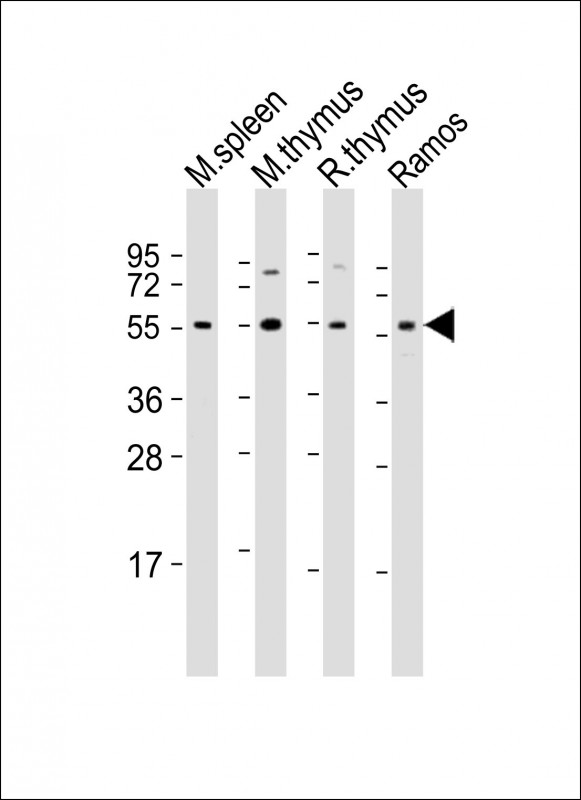
| WB | 1/2000 | Human,Mouse,Rat |
| IF | 咨询技术 | Human,Mouse,Rat |
| IHC | 咨询技术 | Human,Mouse,Rat |
| ICC | 技术咨询 | Human,Mouse,Rat |
| FCM | 咨询技术 | Human,Mouse,Rat |
| Elisa | 咨询技术 | Human,Mouse,Rat |
| Aliases | Proto-oncogene tyrosine-protein kinase LCK, Leukocyte C-terminal Src kinase, LSK, Lymphocyte cell-specific protein-tyrosine kinase, p56-LCK, Lck, Lsk-t |
| Entrez GeneID | 16818 |
| WB Predicted band size | 57.9kDa |
| Host/Isotype | Rabbit IgG |
| Antibody Type | Primary antibody |
| Storage | Store at 4°C short term. Aliquot and store at -20°C long term. Avoid freeze/thaw cycles. |
| Species Reactivity | Human, Mouse, Rat |
| Immunogen | This Mouse Lck antibody is generated from a rabbit immunized with a KLH conjugated synthetic peptide between 224-257 amino acids from the Central region of Mouse Lck. |
+ +
以下是关于Mouse Lck抗体的3篇参考文献及其摘要概括:
---
1. **"Essential role for Lck tyrosine kinase in T cell receptor signal transduction"**
- **作者**: Straus DB, Weiss A
- **摘要**: 本研究利用Lck特异性抗体及基因缺陷模型,揭示了Lck在T细胞受体(TCR)信号传导中的核心作用。实验表明,Lck通过磷酸化TCR下游分子(如CD3ζ链)激活下游信号通路,缺失Lck会导致T细胞发育和功能严重受损。
2. **"Defective T cell development in mice lacking the Lck proto-oncogene"**
- **作者**: Molina TJ et al.
- **摘要**: 通过构建Lck基因敲除小鼠并结合抗体检测,研究发现Lck缺失导致胸腺T细胞发育停滞在CD4⁻CD8⁻阶段,证实Lck是T细胞成熟不可或缺的激酶,并影响TCR信号完整性。
3. **"Dynamic regulation of Lck subcellular localization by TCR activation and biochemical inhibition"**
- **作者**: Ehrlich LIR et al.
- **摘要**: 使用Lck特异性抗体进行免疫荧光和共聚焦显微术,揭示了TCR激活后Lck在免疫突触中的动态定位变化。研究还表明,Lck抑制剂可改变其膜结合状态,进而调控T细胞活化阈值。
---
以上文献均通过Lck抗体探究其在T细胞信号、发育及定位中的功能,涵盖基础机制与实验方法学。
The Mouse Lck antibody is a crucial tool in immunological research, specifically targeting the Lymphocyte-specific protein tyrosine kinase (Lck), a key signaling molecule in T-cell development and activation. Lck, a member of the Src-family kinase (SFK) group, is predominantly expressed in T lymphocytes and natural killer (NK) cells. It associates with the cytoplasmic tails of CD4 or CD8 co-receptors and plays a pivotal role in initiating early signaling events following T-cell receptor (TCR) engagement. Upon antigen recognition, Lck phosphorylates immunoreceptor tyrosine-based activation motifs (ITAMs) on the TCR complex, triggering downstream signaling cascades involving ZAP-70. LAT, and PLCγ1. which ultimately drive T-cell proliferation, differentiation, and cytokine production.
Mouse Lck antibodies are widely used to study Lck expression, post-translational modifications (e.g., phosphorylation at Tyr394 for activation or Tyr505 for inhibition), and interactions with signaling partners. These antibodies are essential in techniques like Western blotting, flow cytometry, immunohistochemistry, and co-immunoprecipitation. Researchers employ them to investigate T-cell-related pathologies, including autoimmune diseases, immunodeficiency disorders, and cancer immunotherapy mechanisms. As Lck dysfunction is linked to abnormal T-cell responses, its selective inhibition or modulation represents a therapeutic target, further underscoring the antibody's relevance in both basic and translational immunology. Commercial Lck antibodies are typically validated for specificity in mouse models, ensuring reliability in experimental systems.
×